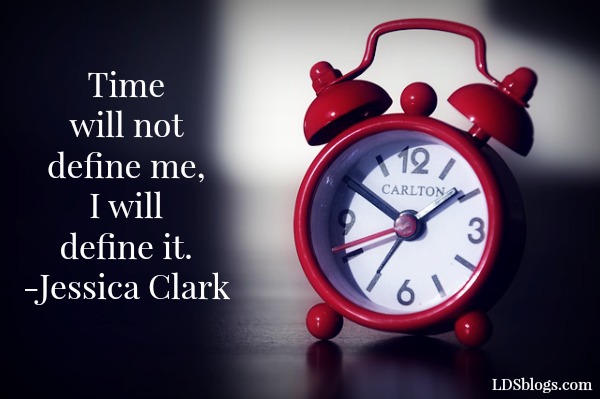How do you measure time? In seconds? Minutes? Hours? Days? Months? Years? How about an Olympiad (4 year cycles)? Or a Gigasecond (1 000, 000, 000 seconds or 31.7 years)? Maybe even a Mega Annum (1 million years)?
 Mathematically speaking, there is no end to the variety of ways you can break time down. Time can be our friend. It can lead us towards things that we desperately desire—a trip to Hawaii, a birthday party, or the arrival of a new born. And time can be our enemy—bills, a test, or the end of your Hawaiian vacation. Everyone’s life is touched by time. We exist in a dimension of time that is divided by world history, regional trends, and family events. And while time has no physical ability to actually touch us, it’s passage brings a multitude of emotions.
Mathematically speaking, there is no end to the variety of ways you can break time down. Time can be our friend. It can lead us towards things that we desperately desire—a trip to Hawaii, a birthday party, or the arrival of a new born. And time can be our enemy—bills, a test, or the end of your Hawaiian vacation. Everyone’s life is touched by time. We exist in a dimension of time that is divided by world history, regional trends, and family events. And while time has no physical ability to actually touch us, it’s passage brings a multitude of emotions.
A NEW ERA
An ERA is an unit of time marked by characteristics, events, or changes on Earth. When you think of an era, you might envision Jane Austen and her world of regency England. You might think of the 90’s and the grunge era, a time when no one looked good and no one seemed to care. Or how about the roaring 20’s—a time of high living, low morals, and hidden vices.
These are chapters that are woven into the story of the World’s history.
But what about our own?
 What era’s have you witnessed in your own life? And has each transition been easy?
What era’s have you witnessed in your own life? And has each transition been easy?
Some eras will be happy ones—newly married, promising career, brand new baby. Opportunities we are happy to adjust to and to revisit.
And some will feel as if disaster has struck—loss of job, death of loved one, the end of a relationship. When you find yourself thrust into a negative circumstance, adjustment can almost have a physical pain.
It is in these new era’s of our life that time actually seems to come to a screeching halt. How can the world keep turning when our life has turned upside down? We might wonder how it is possible that we are alone in our misery? Can anyone else see or feel the pain we suffer?
AN ERA OF GRIEF
In her book “On Death and Dying”, published in 1969, Elisabeth Kubler-Ross proposed five stages of grief. Her main focus, of course, is on those left behind after the loss of a loved one. For this article, however, I would like to propose that grief is not isolated to death, but engulfs all of life’s shifting eras.
As we move from one stage to another, we mourn the loss of an old “normal” as we move into the murky waters of the unknown.
The five stages of grief, as outlined by Kubler-Ross (1969) are as follows:
- Denial and Isolation: a denial that the situation is really happening and a blocking out of the world and hiding from the facts of life.
- Anger: as one tries to enter back into reality, the pain of change becomes too hard to deal with and our hurt is re-directed towards something or someone else.
- Bargaining: as a response to feeling helpless and vulnerable, we try to regain control by telling ourself “if only” stories. “If only I had done this….”, “If only I had done that…”.
- Depression: when we finally realize that the new situation is here to stay, sadness, regret and worry fill our thoughts. (Note: if the depressed feeling does not lift over time, it is wise to seek out thoughtful help).
- Acceptance: finally, as sadness, regret, and worry begin to lift, we begin to accept our new situation in life.
 Each one of these stages can manifest itself at different times and in a different order. I have also found that this process does not necessarily follow solely negative events. I remember experiencing these feelings as a twelve year old when I decided it was time to give up dolls. At the time, I didn’t understand my feelings, but looking back and remembering my mixed emotions and occasional crying jags, I believe I have found the answer. I was entering a new era of life, and experiencing the growing pains.
Each one of these stages can manifest itself at different times and in a different order. I have also found that this process does not necessarily follow solely negative events. I remember experiencing these feelings as a twelve year old when I decided it was time to give up dolls. At the time, I didn’t understand my feelings, but looking back and remembering my mixed emotions and occasional crying jags, I believe I have found the answer. I was entering a new era of life, and experiencing the growing pains.
WHY?
So why am I sharing this information, and what does it have to do with relationships?
It’s as simple as teaching children how to recognize different emotions. I love it when my three-year-old tells me he is ANGRY! He growls it in such a convincing manner. Every time, I let him know I am glad he can recognize that emotion because than it is easier to work through.
Figuring out emotions is like an algebra equation. When we figure out “n”, we can finally solve the puzzle. Before “n” is discovered, we plug in any old number in hopes that the right answer will result.
It is the same with emotional intelligence. We might try anything to fill the void, but unless we know what the void is and means, we are merely feeding a timeless black hole.
SO…
So, here is what I have come up with. Until our brain and heart is convinced that the “new era” is worth living, we can expect the unexpected feelings of emotional turmoil.
 When my husband was let go from his job a while back, I did not know what to expect. We were entering uncharted territory, a brave new world. Only, I did not feel so brave. And so, not knowing how life could go on, I began to mourn for the comfortable life we were leaving behind.
When my husband was let go from his job a while back, I did not know what to expect. We were entering uncharted territory, a brave new world. Only, I did not feel so brave. And so, not knowing how life could go on, I began to mourn for the comfortable life we were leaving behind.
I experienced each stage of grief outlined above. It was not comfortable transitioning from denial to anger to depression than swinging wildly over to bargaining, than back to anger. In fact, time seemed to stand still when I focused solely on anger.
As I began to realize that no atomic bomb had been dropped on our home, or aliens weren’t out to steal my children, it dawned on me that the new era we had entered was not the end of time as we knew it. I had officially entered the acceptance phase.
In fact, if I focused on how I was going to spend that time, I began to realize that I could shift the outlook of our new life and could re-define our family history. Time would not define me, I would define it.
CONCLUSION
Each new phase of life has it’s own defining characteristics. That is the hallmark of what makes an era stand out in history. As we study our personal journey through time, paying close attention to our feelings as we enter the ups and downs, we can more easily define our emotions. By so doing, we can speed up the aches and pains that accompany essential growth. Life was never meant to be easy, but it can only be worth it if we are willing to hold the hands of time and tell our own story.
About Jessica Clark
Jessica Clark is a wife, mom, writer, runner, knitter, and proud Canadian. She graduated from Brigham Young University with a degree in Anthropology, and has been a student of people and cultures ever since. Right now she is busy studying the behavior and cultures of the people of Texas.
Twitter •







